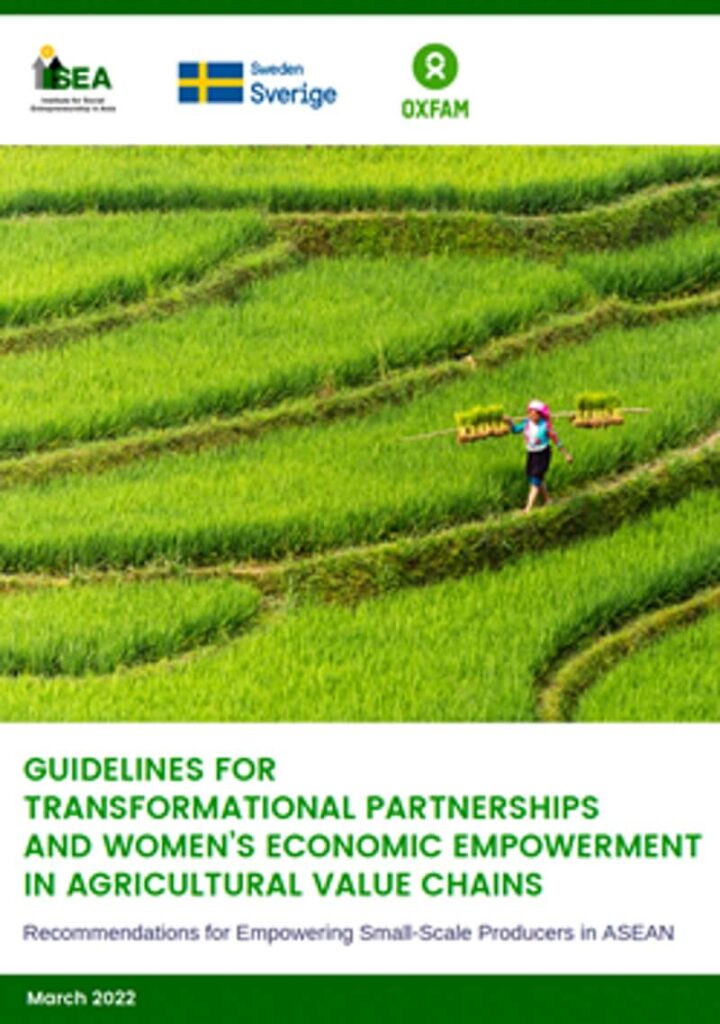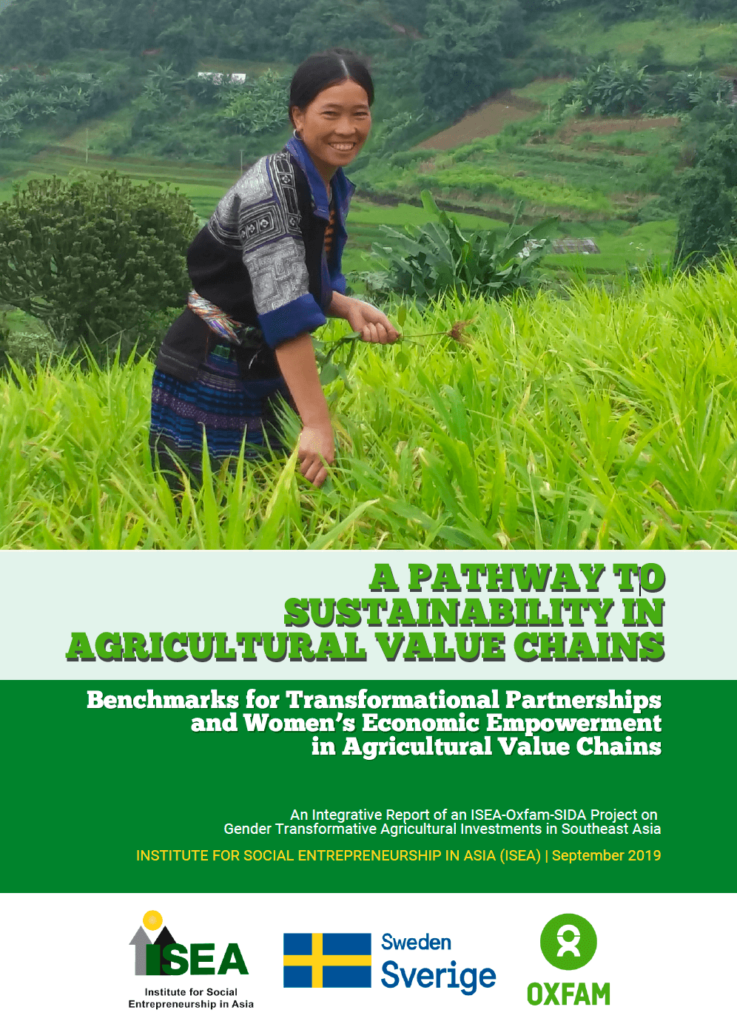Background and Rationale
The COVID 19 pandemic has resulted to an unprecedented health, economic, and social crisis affecting the most vulnerable sectors of society. Women and men small scale producers in agricultural value chains, which include farmers, fishers, agricultural workers and indigenous people are among the most vulnerable sectors that have been affected by the pandemic. SMEs, corporate agribusinesses and social enterprises which engage these small producers in their supply chains have also experienced various levels of downturn, some more severely than others. Lockdowns and community quarantines affected production, processing, marketing channels and markets of various agricultural value chains. Seed to table social enterprise systems linking farmers and fishers with urban consumers of organic produce and healthy food were not spared as they experienced logistical nightmares.
The United Nations profoundly articulates the dire impact of the pandemic during the year that was intended to be groundbreaking for gender equality. 2020 is supposed to mark the 25th year of the Beijing Platform for Action[i]. But with the COVID 19 pandemic, even the limited gains made in the past decade are at risk of being rolled back. COVID19 is deepening pre-existing inequalities and exposing vulnerabilities in social, political and economic systems, which are in turn amplifying the impacts of the pandemic. With women in agriculture and agricultural value chains being largely invisible, unrecognized, underserved, undervalued and overburdened with unpaid care work even before the pandemic, their situation is even more dire today.
The UN concludes that “every COVID-19 response plan, and every recovery package and budgeting of resources, needs to address the gender impacts of this pandemic. This means: (1) including women and women’s organizations at the heart of the COVID-19 response; (2) transforming the inequities of unpaid care work into a new, inclusive care economy that works for everyone; and (3) designing socio-economic plans with an intentional focus on the lives and futures of women and girls”.[ii]
The disruptions in agricultural value chains and global food systems profoundly exposed the vulnerability and overdependence of urban populations and rural communities to global markets. They demonstrated the importance of shorter food miles and local food systems that are founded on the resilience and sustainability of farming, fishing and small producer communities.
In Southeast Asia, governments are deeply concerned with the impacts of COVID-19 on ASEAN cooperation in food, agriculture and forestry and the disruption of the food (and non-food) supply chain in the region. The ASEAN Ministers on Agriculture and Forestry urged the ASEAN Member States (AMS) to implement necessary measures, projects and programs at the national level to meet the immediate food needs of the ASEAN population, particularly the vulnerable groups in society. Further, they highlighted the need to boost AMS’ social protection programs for smallholder farmers, and Micro, Small and Medium Enterprises.[iii]


The BTP WEE in AVCs as Inspiration to WE LIVE FOOD
Since 2015, the Institute for Social Entrepreneurship in Asia (ISEA), in partnership with Oxfam and the Swedish Embassy in Bangkok have been implementing a project entitled Gender transformative and Responsible Agricultural Investments in Southeast Asia (GRAISEA). From 2015-2017, and under the GRAISEA Project, ISEA led a study of best practices and inclusive businesses that had made a significant impact on the lives of women and men small scale producers in the Philippines, Vietnam, Indonesia and Thailand.[iv] The agricultural value chains covered by the study were muscovado sugar and coffee in the Philippines; organic coconut sap sugar and green mussel in Indonesia; tea, ginger and gac in Vietnam; and organic fish and formalin-free sea food in Thailand. The study was conducted in partnership with the Center for Social Initiatives Promotion (CSIP) in Vietnam, Trubus Bina Swadaya and Yayasan Dompet Dhuafa in Indonesia and Change Fusion in Thailand. The study resulted to a set of Benchmarks for Transformational Partnerships and Women’s Economic Empowerment in Agricultural Value Chains or BTP WEE in AVCs[v]
These benchmarks are aspirational standards related to 8 elements shown in Figure 1. These 8 elements were synthesized as the critical success factors of agricultural value chain interventions that have created substantial impact on the lives and position of women and men small scale producers. Hence, these benchmarks raise the bar on how enterprises and other stakeholders in agricultural value chains (AVCs) could sustainably impact on the lives of small-scale producers, especially women, their households and their communities. They are, collectively, a pathway to sustainability as these benchmarks are meant to provide guideposts among enterprises and other stakeholders in AVCs who aspire to make a meaningful contribution to the achievement of the ambitious 2030 Agenda for Sustainable Development.[vi]
From 2018-2019, under the GRAISEA Project and with additional assistance from the Japan Foundation Asia Center (JFAC), ISEA and its partners developed Scorecards that could be used by Agricultural Value Chain Interventions, SMEs and Social Enterprises as well as Corporate Agribusinesses as learning, evaluation and planning tools to improve their practice in relation to the 8 elements of the benchmarks.
In 2019, ISEA also used the benchmarks as framework for assisting the subsector action research and strategic planning process of stakeholders for scaling up the impact of a selected biodiversity-friendly enterprise (BDFE) initiative in the abaca subsector in Eastern Samar, Philippines[vii] with the assistance of the United Nations Development Programme (UNDP) Global Environment Facility (GEF) SGP5 and the Biodiversity Management Bureau of the Department of Environment and Natural Resources. This collaborative project also resulted to a Handbook on Strategic Planning for Scaling Up Biodiversity Friendly Enterprise (BDFE) Initiatives that is in the process of being published by the UNDP GEF.
[i] Policy Brief on the Impact of COVID-19 on Women (United Nations, 2020)
[ii] Policy Brief on the Impact of COVID-19 on Women (United Nations, 2020)
[iii] https://asean.org/asean-pledges-ensure-food-security-covid-19-outbreak/
[iv] The 8 cases studied were Alter Trade Foundation Inc/Negros Organic Fair Trade Association and Bote Central/Philippine Coffee Alliance in the Philippines; KSU Jatirogo and P.T. Karya Masyarakat Mandiri or KMM/ISM Sinar Abadi Cooperative in Indonesia; HITEACO and Dragon Vietnam Investment Company or DVIC in Vietnam; and Lemon Farm Cooperative/Fisherfolk Enterprise and GreenNet Cooperative/Earth Net Foundation in Thailand.
[v] A Pathway to Sustainability: Benchmarks for Transformational Partnerships and Women’s Economic Empowerment in Agricultural Value Chains (ISEA, 2019); Social Enterprises and Agricultural Value Chains in Southeast Asia (Dacanay, 2019)
[vi] The 2030 Agenda for Sustainable Development (United Nations, 2015)
[vii] The biodiversity friendly enterprise (BDFE) initiative was led by the Eastern Visayas Partnership for Rural Development and the Central Farmers’ Association, a federation of women and men abaca producer in Eastern Samar.



